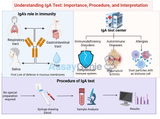Blog
COVID-19's Impact on Brain Aging and Cognitive Decline
Impact of COVID-19 on Brain Aging and Cognitive DeclineThe COVID-19 pandemic has had profound effects on various aspects of human health, including mental health. A recent study involving nearly 1,000 participants revealed that while brain aging was not directly linked to COVID-19 infection status, significant cognitive decline was observed. This highlights the pandemic's broader implications on mental health and cognitive function.Study SummaryThe study, conducted by Gemma Conroy and published in 2025, examined the cognitive health of individuals during the pandemic. Researchers found that cognitive decline was prevalent among participants, regardless of their COVID-19 infection status. Thi
…
24th Jul 2025
Understanding Zonulin and Its Role in Intestinal Health
Understanding Zonulin: Key Regulator of Intestinal Barrier Function
Zonulin is a crucial physiological modulator of intercellular tight junctions, playing a significant role in regulating intestinal permeability. This article explores the implications of zonulin in various autoimmune diseases, including celiac disease and type 1 diabetes, and highlights the importance of understanding its biological mechanisms.
Introduction
Zonulin is the only known physiological modulator of intercellular tight junctions, which are essential for maintaining the integrity of the intestinal barrier. Disruption of this barrier can lead to increased intestinal permeability, often referred to as "leaky gut,"
…
24th Jul 2025
EGFR Pathway and YAP in Non-Small Cell Lung Cancer
Understanding the EGFR Pathway and YAP in Non-Small Cell Lung CancerThe epidermal growth factor receptor (EGFR) pathway plays a pivotal role in the development and progression of non-small cell lung cancer (NSCLC). This article delves into the intricate relationship between the EGFR pathway, Yes-associated protein (YAP), and the tumor microenvironment, highlighting their implications for cancer progression and treatment strategies.IntroductionNon-small cell lung cancer (NSCLC) is one of the most prevalent forms of lung cancer, characterized by its aggressive nature and poor prognosis. The EGFR pathway is a well-established oncogenic pathway that significantly influences tumor growth and meta
…
22nd Jul 2025
PD-1 Blockade in B-Cell Lymphomas: A Comprehensive Overview
Understanding PD-1 Blockade in B-Cell Lymphomas
Understanding PD-1 Blockade in B-Cell Lymphomas
Introduction
The programmed cell death protein 1 (PD-1) and its ligand PD-L1 have emerged as pivotal players in the landscape of cancer immunotherapy, particularly in B-cell lymphomas. This article explores the role of PD-1 and PD-L1 in these malignancies, highlighting the potential of PD-1 blockade as a therapeutic strategy. We will review ongoing clinical trials and discuss the implications for patient treatment.
Study Summary
In recent years, the expression of PD-1 and PD-L1 has been extensively studied in B-cell lymph
…
21st Jul 2025
Immune-Checkpoint Inhibition in Cancer Prevention
Harnessing Immune-Checkpoint Inhibition for Cancer Prevention
Immune-checkpoint inhibition (ICI) has emerged as a pivotal strategy in cancer therapy, particularly in the context of tumor prevention. This article delves into a recent study that investigates the role of ICI in prolonging overall survival in cancer-prone mice, emphasizing its potential for sustained immune modulation. By understanding the mechanisms at play, researchers can better harness these insights for human health applications.
Study Summary
The study conducted by A. Wolff (2023) reveals that preventive ICI significantly prolongs the overall survival of cancer-prone mice. The findings sug
…
21st Jul 2025
Understanding the Bcl-2 Pathway in Cancer Therapy
Understanding the Bcl-2 Pathway: Implications for Cancer Therapy
The Bcl-2 family of proteins plays a pivotal role in regulating apoptosis, a crucial process for maintaining cellular homeostasis. This article reviews the Bcl-2-regulated apoptotic pathway, highlighting its critical role in cell survival and death. Understanding these mechanisms is essential for developing targeted cancer therapies.
Introduction
Apoptosis, or programmed cell death, is a fundamental biological process that ensures the removal of damaged or unnecessary cells. The Bcl-2 family of proteins, including Bcl-2, Bcl-xL, and Bax, are key regulators of this pathway. Dysregulation of the
…
18th Jul 2025
Exhibition at the University of Oxford's BioEscalator
Showcasing Innovation Assay Genie recently took part in an engaging event at Oxford’s BioEscalator, a leading innovation hub supporting scientific progress and entrepreneurship. The day provided a valuable opportunity to connect directly with researchers, highlight Assay Genie’s range of life sciences tools (including ELISA kits, assay reagents, and in vivo antibodies) and demonstrate the company’s commitment to improving research outcomes. The experience highlighted how spaces like the BioEscalator help foster direct researcher engagement and accelerate innovation across the life sciences.Connecting with Researchers - Chris McNallyDr. Chris McNally, Account Manager at Ass
…
10th Jul 2025
Department of Oncology Retreat 2025
Department of Oncology RetreatAssay Genie was honoured to sponsor and participate in the inaugural 2025 Department of Oncology Retreat, hosted by the University of Lausanne and Lausanne University Hospital (CHUV) at the beautiful and historic Château d’Oron, alongside our valued Swiss partner, Chemie Brunschwig.With over 180 attendees, including principal investigators, lab managers, students, and administrative staff, the retreat celebrated more than 40 years of the Department’s international leadership in cancer and biomedical research.As a proud premium sponsor, Assay Genie reaffirmed its commitment to supporting the oncology community and advancing groundbreaking research i
…
30th May 2025
Cure CLCN4 2025
Cure CLCN4 2025Assay Genie was honored to attend and present at the 2025 Cure CLCN4 Scientific Conference, held on May 19–20 at Friends House in London and online. This annual event, now in its fourth year, brought together researchers, clinicians, industry leaders, and families to advance understanding and treatment of CLCN4-related neurodevelopmental disorders.As a proud platinum sponsor, Assay Genie reaffirmed its long-standing support for the Cure CLCN4 community. Since 2022, we have partnered with Cure CLCN4 to provide high-quality reagents and scientific insights that empower researchers worldwide. Our sponsorship underscores our dedication to accelerating research in rar
…
26th May 2025
Alemtuzumab: Mechanism, Applications, and Biosimilar Advancements
Quick Facts About AlemtuzumabWhat is Alemtuzumab?Alemtuzumab is a monoclonal antibody targeting CD52, primarily used in the treatment of multiple sclerosis (MS) and certain cancers like chronic lymphocytic leukemia (CLL).What is the mechanism of action for Alemtuzumab?Alemtuzumab binds to CD52 on lymphocytes, leading to their depletion via immune-mediated cytotoxicity, resetting the immune system in diseases like MS.What are the clinical applications of Alemtuzumab?Alemtuzumab is FDA-approved for relapsing-remitting multiple sclerosis (RRMS) and is used off-label for various hematologic conditions.What are Alemtuzumab’s common side effects?Side effects include infusion-related
…
26th May 2025
Enavatuzumab: Revolutionizing Cancer Research Through Novel Therapeutics
Quick Facts About EnavatuzumabWhat is Enavatuzumab?Enavatuzumab is a monoclonal antibody targeting the TWEAK receptor (Fn14), pivotal in tumor growth and immune regulation.What is the mechanism of action for Enavatuzumab?Enavatuzumab binds to Fn14, inhibiting signaling pathways that promote tumor cell proliferation and survival while enhancing immune response.What are the clinical applications of Enavatuzumab?It is under investigation for treating solid tumors and hematologic malignancies due to its dual action of direct tumor cell targeting and immune system modulation.Is Enavatuzumab safe?Emerging studies indicate a manageable safety profile, though further trials are crucial
…
26th May 2025
Praluzatamab: Unveiling the Promise of CD47-Targeted Therapy in Cancer Research
Quick Facts About PraluzatamabWhat is Praluzatamab?Praluzatamab is an experimental monoclonal antibody that targets CD47, a “don’t eat me” signal used by cancer cells to evade immune destruction.What role does Praluzatamab play in targeting CD47?It blocks CD47–SIRPα signaling, promoting phagocytosis of tumor cells and enhancing antitumor immune responses.Is Praluzatamab safe?Initial studies reported tolerable safety profiles, but further trials were needed to fully assess its risks and hematologic side effects.What are the clinical applications of Praluzatamab?Praluzatamab has been investigated for treating myelodysplastic syndromes (MDS), acute myeloid leukemia (AML), and soli
…
13th May 2025
Polatuzumab: Redefining Targeted Therapies in B-Cell Lymphoma
What You Need to Know About PolatuzumabWhat is Polatuzumab??Polatuzumab vedotin is an antibody-drug conjugate targeting CD79b, a component of the B-cell receptor, used primarily in B-cell lymphomas like DLBCL.What is the mechanism of action for Polatuzumab?It delivers a cytotoxic payload directly to B cells by binding to CD79b, leading to selective cell death with reduced off-target effects.What are the clinical applications of Polatuzumab?Polatuzumab is used in combination therapies for relapsed/refractory DLBCL and is being explored for front-line treatment.Is Polatuzumab safe?It has a manageable safety profile, with common side effects including neutropenia, peripheral neuro
…
9th May 2025
AACR 2025
Assay Genie attended AACR 2025 in ChicagoSean, Shane and David had a great few days in Chicago discussing research with scientists from across the globe at the Assay Genie booth. "It's great to see the progress being made in cancer discoveries each year we attend the AACR and meeting the researchers that are so enthusiastic about the role they play in helping cure cancer" - Seán Mac Fhearraigh PhD (Assay Genie Co-Founder).Next year Assay Genie will be in San Diego attending the 2026 edition to continue their goal of making scientists smile and hopefully playing a role in progessing our knowledge of cancer.
…
9th May 2025
IgA Testing: Complete Diagnostic Guide + Interpretation Methods | Expert Protocols
IgA Testing: Complete Diagnostic Guide + Interpretation Methods | Expert ProtocolsThe IgA test, also known as immunoglobulin A test, is a diagnostic tool used to measure the levels of IgA antibodies in the blood. Immunoglobulin A (IgA) is a type of antibody that plays a crucial role in the immune system's defense against infections. This test helps in diagnosing certain medical conditions related to the immune system, such as autoimmune diseases and allergies. In this comprehensive guide, we will delve deeper into the importance of the IgA test, its procedure, interpretation of results, factors affecting IgA levels, and clinical significance.Importance of IgA TestImmunoglo
…
7th May 2025
Milatuzumab: Unveiling Its Role in Cancer Immunotherapy and Research
What You Need to Know About MilatuzumabWhat is Milatuzumab?Milatuzumab is a humanized monoclonal antibody targeting CD74, a molecule involved in antigen presentation and cell signaling.What is the mechanism of action for Milatuzumab?Milatuzumab binds CD74, interrupting survival pathways and triggering antibody-dependent cell-mediated cytotoxicity (ADCC).Is Milatuzumab safe?Milatuzumab has shown manageable safety in early trials, though further studies are needed to fully define its toxicity profile.What diseases is Milatuzumab being studied for?Milatuzumab has been investigated in hematological malignancies like multiple myeloma and chronic lymphocytic leukemia, and autoimmune
…
2nd May 2025
Ozuriftamab: A Closer Look at This Anti-CD47 Antibody in Cancer Immunotherapy
What You Need to Know About OzuriftamabWhat is Ozuriftamab?Ozuriftamab is an investigational monoclonal antibody targeting CD47, designed to enhance immune-mediated clearance of cancer cells.What is the mechanism of action for Ozuriftamab?It blocks the CD47 “don’t eat me” signal, enabling macrophages to recognize and eliminate malignant cells more effectively.What are the clinical applications of Ozuriftamab?Ozuriftamab has been studied primarily in myelodysplastic syndromes (MDS) and acute myeloid leukemia (AML), showing potential in combination therapies.Is Ozuriftamab safe?Initial studies revealed a manageable safety profile, although treatment-emergent cytopenias and infusi
…
1st May 2025
Erenumab: Transforming Migraine Prevention Through CGRP Receptor Inhibition
Quick Facts About ErenumabWhat is Erenumab?Erenumab is a fully human monoclonal antibody designed to prevent migraines by targeting the calcitonin gene-related peptide (CGRP) receptor. How does Erenumab work?It binds selectively to the CGRP receptor, inhibiting its function and thereby reducing migraine frequency. What are the clinical applications of Erenumab?Erenumab is primarily used for the preventive treatment of migraines in adults. 1.) Understanding ErenumabErenumab represents a significant advancement in migraine therapy as the first FDA-approved treatment specifically designed to prevent migraines by inhibiting the calcitonin gene-related peptide (CGRP) receptor. De
…
1st Apr 2025
Guselkumab: Advancing Psoriasis and Autoimmune Disease Research Through IL-23 Targeting
Quick Facts About GuselkumabWhat is Guselkumab?Guselkumab is a biologic therapy that selectively targets the p19 subunit of interleukin-23 (IL-23), playing a critical role in inflammatory autoimmune conditions.What is the mechanism of action for Guselkumab?It inhibits IL-23 signaling by binding to the p19 subunit, disrupting downstream inflammatory pathways involved in diseases like psoriasis and psoriatic arthritis.Is Guselkumab safe?Clinical trials have shown Guselkumab to have a favorable safety profile, with most side effects being mild to moderate, such as upper respiratory infections and injection-site reactions.What conditions does Guselkumab treat?Guselkumab is FDA-appr
…
27th Mar 2025
Narsoplimab: Targeting MASP-2 to Advance Therapies in Immune-Mediated Disorders
Quick Facts About NarsoplimabWhat is Narsoplimab?Narsoplimab is a human monoclonal antibody that targets MASP-2, a key enzyme in the lectin pathway of the complement system.What is the mechanism of action for Narsoplimab?Narsoplimab inhibits MASP-2, blocking the activation of the lectin complement pathway and reducing inflammatory damage in immune-mediated diseases.What are the clinical applications of Narsoplimab?It has been studied in IgA nephropathy, HSCT-TMA, and other inflammatory conditions, with emerging evidence in COVID-19-related trials.Is Narsoplimab FDA-approved?Narsoplimab has received Breakthrough Therapy designation, but full FDA approval is pending further data
…
26th Mar 2025
Farletuzumab: Advancing Antibody-Drug Conjugate Research in Ovarian Cancer
Quick Facts About FarletuzumabWhat is Farletuzumab?Farletuzumab is a humanized monoclonal antibody targeting folate receptor alpha (FRα), a protein overexpressed in ovarian and other epithelial cancers.What is the mechanism of action for Farletuzumab?It binds to FRα on tumor cells and mediates cytotoxic effects via antibody-dependent cellular cytotoxicity (ADCC), complement-dependent cytotoxicity (CDC), and internalization.What are the clinical applications of Farletuzumab?It has been explored in clinical trials for epithelial ovarian cancer, particularly in combination with agents like carboplatin, paclitaxel, or eribulin.Is Farletuzumab used with Ecteribulin?Yes. Farletuzumab
…
26th Mar 2025
Ulviprubart: A Breakthrough in Autoimmune Disease Treatment
Quick Facts About UlviprubartWhat is Ulviprubart?Ulviprubart is an experimental complement inhibitor designed to modulate immune responses in autoimmune diseases.What is the mechanism of action for Ulviprubart?Ulviprubart targets the complement system, reducing excessive immune activation and preventing tissue damage.What are the clinical applications of Ulviprubart?Research is evaluating Ulviprubart’s potential in treating autoimmune diseases such as lupus, rheumatoid arthritis, and atypical hemolytic uremic syndrome.1.) Understanding UlviprubartUlviprubart represents a significant advancement in immunotherapy, particularly for autoimmune diseases where excessive compleme
…
19th Mar 2025
Obinutuzumab: Advancing Targeted Therapy in Hematologic Cancers
Quick Facts About ObinutuzumabWhat is Obinutuzumab?Obinutuzumab is a monoclonal antibody targeting CD20, primarily used in treating B-cell malignancies such as chronic lymphocytic leukemia (CLL) and follicular lymphoma.What is the mechanism of action for Obinutuzumab?Obinutuzumab works by binding to CD20 on B-cells, inducing direct cell death and enhancing antibody-dependent cellular cytotoxicity (ADCC) and phagocytosis.What are the clinical applications of Obinutuzumab?It is approved for CLL and follicular lymphoma, often in combination with other therapies such as venetoclax or bendamustine.1.) Understanding ObinutuzumabObinutuzumab, a next-generation glycoengineered monoclon
…
19th Mar 2025
Abituzumab: Understanding Its Role in Cancer and Fibrosis Research
Quick Facts About AbituzumabWhat is Abituzumab?Abituzumab is a monoclonal antibody that targets αv-integrins, playing a role in cancer treatment and fibrotic diseases.What is the mechanism of action for Abituzumab?It inhibits αv-integrins to prevent tumor cell adhesion, migration, and survival, making it a potential therapy for colorectal and prostate cancer.What are the clinical applications of Abituzumab?It has been investigated for metastatic colorectal cancer (CRC), prostate cancer, systemic sclerosis, and fibrotic diseases like scleroderma.1.) Understanding AbituzumabInitially developed by Merck Serono, Abituzumab has undergone extensive preclinical and clinical evaluation
…
18th Mar 2025








